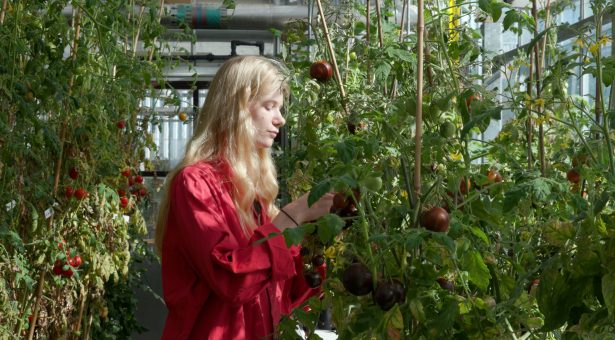
A new Innovation Hub for research into biofortification to increase nutrient levels in crops and food is being launched on the Norwich Research Park.
The Quadram institute and John Innes Centre will establish the Innovation Hub for Improving Health and Nutrition through Biofortification to strengthen the UK's position as a world-leader for research and commercialisation of biofortification – the development of crops, foods, feed and fodder with higher levels of nutrients.
There is a need to transform current food systems to ensure sufficient nutrition is available for all through sustainable routes. Biofortification has a role to play in delivering that. This new hub will bring together the expertise needed to address new opportunities and innovations in biofortification and build new capacity to address the challenges, delivering real world applications.
The Biofortification Hub combines expertise in soil, crop genetics, food innovation and human health and nutrition. It will work closely on the biofortification of food and feed crops with farmers, food producers and retailers across the supply chain.
Professor Martin Warren of the Quadram Institute and lead of the Biofortification Hub said "Biofortification provides the opportunity to improve the nutritional properties of foods through both traditional and modern approaches. Improving the nutritional quality of foods is essential as we look to offer enhanced dietary choices that will increase the healthy lifespan of individuals.
Professor Cathie Martin from the John Innes Centre and hub co-lead said: "Deficiencies in micronutrients affect not only the young and vulnerable but also health throughout the life course. Developing ways to improve levels of micronutrition in foods is key to addressing sustainable good health. Biofortification used to be considered necessary only for developing countries with extensive 'hidden hunger' but biofortification in a much broader context must now be considered a priority for the UK to maintain the health of consumers."
This is one of six new innovation hubs to be launched to create the Diet and Health Open Innovation Research Club. The hubs will address shared barriers to innovation across the food and drink sector.
From maximising the nutritional value of foods to better understanding what influences food choices and the relationship between food and health, these new innovation hubs will bring together world-class leaders from academia, industry and wider stakeholders. Poor diet has a huge impact on public health. As recently highlighted in the Government Food Strategy, there remains a major challenge in producing and encouraging the uptake of healthier, more nutritious food products in the UK. Led by the Biotechnology and Biological Sciences Research Council (BBSRC), with support from DEFRA, Innovate UK and the Medical Research Council (MRC), the new Diet and Health Open Innovation Research Club (OIRC) represents an investment of almost £15m into research and innovation that will help address the critical, shared barriers to innovation across the food and drink sector. This new funding forms part of the recently announced of BBSRC and Innovate UKs strategic partnership.
The new innovation hubs will support and drive progress across one or more of the following strategic priority areas:
1. Understanding the interplay between food components and human physiology
2. Improving health and nutrition through biofortification
3. Biological, social and psychological determinants of food choice and eating behaviour
4. Development of functional foods and beverages
5. Understanding how food and beverages deliver improved nutrition across the life-course.
Each Innovation Hub will build cross-sector collaborative networks to improve the UK's capacity and capability and deliver world-class innovation around diet and health.
Dr Lee Beniston FRSB, Associate Director for Industry Partnerships and Collaboration at BBSRC, said:
"The Diet and Health Open Innovation Research Club is a new approach for BBSRC that will provide an open innovation platform for businesses, researchers and wider innovation and UK Government stakeholders to work together across six hubs focused on a range of diverse diet and health research and innovation priorities.
"Our partnership with Innovate UK, DEFRA and MRC greatly enhances what the programme can achieve whilst also providing a strong connectivity to national strategy and policy; all of this ultimately helping to deliver wider benefits to an industry that is a key part of the UK economy."
Richard Hebdon, Director of Health and Life Sciences at Innovate UK, said:
"Innovate UK's investment in the BBSRC-led Diet and Health Open Innovation Research Club supports our investment in the £20m Better Food for All programme.
"Together these programmes will provide funding to support strategic, collaborative research and development between businesses and researchers, policy makers and wider stakeholders in the important area of diet and health, helping to bridge the gap between research and translation.
"This is another fantastic investment that builds on Innovate UK's strong strategic partnership with BBSRC to support collaboration between business and the UK research base."
Dr Laura Dickens, Associate Director for Industry Partnerships at MRC, said:
"We are pleased to participate in this partnership supporting ambitious new research as part of our priorities to address important nutrition and health challenges and broaden our support for industry-academia partnerships.
"Establishing these innovation hubs will enable new research collaborations in this field to foster innovative approaches to solve an important public health issue that affects all of us. MRC support towards establishing the Brunstrom hub in particular will benefit underrepresented communities."
Food Minister Mark Spencer said:
"I am delighted that scientists and experts can now come together in these new innovation hubs to convene the latest science around obesity and healthy eating.
"Together they can work to close the knowledge gaps between current dietary trends and obesity, whilst improving our understanding of the relationship between food and health.
"Supporting this research is part of our commitment in the Food Strategy to boost healthier, more sustainable and accessible diets."
Details of the other successful Innovation Hubs are available on the BBSRC website.






